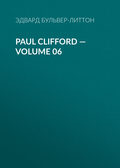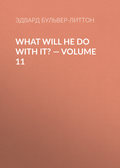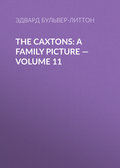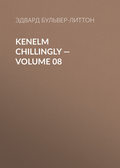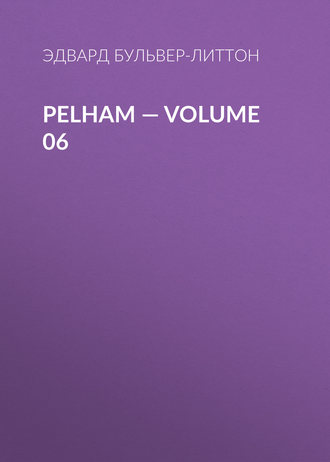
Эдвард Бульвер-Литтон
Pelham — Volume 06
"I incline to your opinion," cried Vincent, laughing. "The reason we dislike vanity in others, is because it is perpetually hurting our own. Of all passions (if for the moment I may call it such) it is the most indiscreet; it is for ever blabbing out its own secrets. If it would but keep its counsel, it would be as graciously received in society, as any other well-dressed and well-bred intruder of quality. Its garrulity makes it despised. But in truth it must be clear, that vanity in itself is neither a vice nor a virtue, any more than this knife, in itself, is dangerous or useful; the person who employs gives it its qualities; thus, for instance, a great mind desires to shine, or is vain, in great actions; a frivolous one, in frivolities: and so on through the varieties of the human intellect. But I cannot agree with Mr Clarendon, that my admiration of Algernon Sidney (Cato I never did admire) would be at all lessened by the discovery, that his resistance to tyranny in a great measure originated in vanity, or that the same vanity consoled him, when he fell a victim to that resistance; for what does it prove but this, that, among the various feelings of his soul, indignation at oppression, (so common to all men)—enthusiasm for liberty, (so predominant in him)— the love of benefiting others—the noble pride of being, in death, consistent with himself; among all these feelings, among a crowd of others equally honourable and pure—there was also one, and perhaps no inconsiderable feeling of desire, that his life and death should be hereafter appreciated justly—contemptu famoe, contemni virtutem— contempt of fame, is the contempt of virtue? Never consider that vanity an offence, which limits itself to wishing for the praise of good men for good actions: next to our own esteem, says the best of the Roman philosophers, 'it is a virtue to desire the esteem of others.'"
"By your emphasis on the word esteem," said Lady Roseville, "I suppose you attach some peculiar importance to the word?"
"I do," answered Vincent. "I use it in contradistinction to admiration. We may covet general admiration for a bad action—(for many bad actions have the clinquant, which passes for real gold)—but one can expect general esteem only for a good one."
"From this distinction," said Ellen, modestly, "may we not draw an inference, which will greatly help us in our consideration of vanity; may we not deem that vanity, which desires only the esteem of others to be invariably a virtue, and that which only longs for admiration to be frequently a vice?"
"We may admit your inference," said Vincent; "and before I leave this question, I cannot help remarking upon the folly of the superficial, who imagine, by studying human motives, that philosophers wish to depreciate human actions. To direct our admiration to a proper point, is surely not to destroy it; yet how angry inconsiderate enthusiasts are, when we assign real, in the place of exaggerated feelings. Thus the advocates for the doctrine of utility—the most benevolent, because the most indulgent, of all philosophies—are branded with the epithets of selfish and interested; decriers of moral excellence, and disbelievers in generous actions. Vice has no friend like the prejudices which call themselves virtue. La pretexte ordinaire de ceux qui font le malheur des autres est qu'ils veulent leur bien."
My eyes were accidentally fixed on Glanville as Vincent ceased; he looked up, and coloured faintly as he met my look; but he did not withdraw his own—keenly and steadily we gazed upon each other, till Ellen, turning round suddenly, remarked the unwonted meaning of our looks, and placed her hand in her brother's, with a sort of fear.
It was late; he rose to withdraw, and passing me, said in a low tone, "A little while, and you shall know all." I made no answer—he left the room with Ellen.
"Lady Roseville has had but a dull evening, I fear, with our stupid saws and antient instances," said Vincent. The eyes of the person he addressed were fixed upon the door; I was standing close by her, and as the words struck her ear, she turned abruptly;—a tear fell upon my hand—she perceived it, and though I would not look upon her face, I saw that her very neck blushed; but she, like me, if she gave way to feeling, had learnt too deep a lesson from the world, not readily to resume her self- command; she answered Vincent railingly, upon his bad compliment to us, and received our adieus with all her customary grace, and more than her customary gaiety.
CHAPTER LXIX
Ah! Sir, had I but bestowed half the pains in learning a trade, that I have in learning to be a scoundrel, I might have been a rich man at this day; but, rogue as I am, still I may be your friend, and that, perhaps, when you least expect it.
—Vicar of Wakefield.
What with the anxiety and uncertainty of my political prospects, the continued dissipation in which I lived, and, above all, the unpropitious state of my belle passion, my health gave way; my appetite forsook me—my sleep failed me—a wrinkle settled itself under my left eye, and my mother declared, that I should have no chance with an heiress: all these circumstances together, were not without their weight. So I set out one morning to Hampton Court, (with a volume of Bishop Berkely, and a bottle of wrinkle water,) for the benefit of the country air.
It is by no means an unpleasant thing to turn one's back upon the great city, in the height of its festivities. Misanthropy is a charming feeling for a short time, and one inhales the country, and animadverts on the town, with the most melancholy satisfaction in the world. I sat myself down at a pretty little cottage, a mile out of the town. From the window of my drawing-room I revelled in the luxurious contemplation of three pigs, one cow, and a straw-yard; and I could get to the Thames in a walk of five minutes, by a short cut through a lime-kiln. Such pleasing opportunities of enjoying the beauties of nature, are not often to be met with: you may be sure, therefore, that I made the most of them. I rose early, walked before breakfast, pour ma sante, and came back with a most satisfactory head-ache, pour mes peines. I read for just three hours, walked for two more, thought over Abernethy, dyspepsia, and blue pills, till dinner; and absolutely forgot Lord Dawton, ambition, Guloseton, epicurism—aye, all but—of course, reader, you know whom I am about to except—the ladye of my love.
One bright, laughing day, I threw down my book an hour sooner than usual, and sallied out with a lightness of foot and exhilaration of spirit, to which I had long been a stranger. I had just sprung over a stile that led into one of those green shady lanes, which make us feel the old poets who loved, and lived for, Nature, were right in calling our island "the merry England"—when I was startled by a short, quick bark, on one side of the hedge. I turned sharply round; and, seated upon the sward, was a man, apparently of the pedlar profession; a large deal box was lying open before him; a few articles of linen, and female dress, were scattered round, and the man himself appeared earnestly occupied in examining the deeper recesses of his itinerant warehouse. A small black terrier flew towards me with no friendly growl. "Down," said I: "all strangers are not foes, though the English generally think so."
The man hastily looked up; perhaps he was struck with the quaintness of my remonstrance to his canine companion; for, touching his hat, civilly, he said—"The dog, Sir, is very quiet; he only means to give me the alarm by giving it to you; for dogs seem to have no despicable insight into human nature, and know well that the best of us may be taken by surprise."
"You are a moralist," said I, not a little astonished in my turn by such an address from such a person. "I could not have expected to stumble upon a philosopher so easily. Have you any wares in your box likely to suit me? if so, I should like to purchase of so moralizing a vendor?"
"No, Sir," said the seeming pedlar, smiling, and yet at the same time hurrying his goods into his box, and carefully turning the key—"no, Sir, I am only a bearer of other men's goods; my morals are all that I can call my own, and those I will sell you at your own price."
"You are candid, my friend," said I, "and your frankness, alone, would be inestimable in this age of deceit, and country of hypocrisy."
"Ah, Sir!" said my new acquaintance, "I see already that you are one of those persons who look to the dark side of things; for my part, I think the present age the best that ever existed, and our own country the most virtuous in Europe."
"I congratulate you, Mr. Optimist, on your opinions," quoth I, "but your observation leads me to suppose, that you are both an historian and a traveller: am I right?"
"Why," answered the box-bearer, "I have dabbled a little in books, and wandered not a little among men. I am just returned from Germany, and am now going to my friends in London. I am charged with this box of goods; God send me the luck to deliver it safe."
"Amen," said I; "and with that prayer and this trifle, I wish you a good morning."
"Thank you a thousand times, Sir, for both," replied the man—"but do add to your favours by informing me of the right road to the town of—
"I am going in that direction myself; if you choose to accompany me part of the way, I can ensure your not missing the rest."
"Your honour is too good!" returned he of the box, rising, and slinging his fardel across him—"it is but seldom that a gentleman of your rank will condescend to walk three paces with one of mine. You smile, Sir; perhaps you think I should not class myself among gentlemen; and yet I have as good a right to the name as most of the set. I belong to no trade—I follow no calling: I rove where I list, and rest where I please: in short, I know no occupation but my indolence, and no law but my will. Now, Sir, may I not call myself a gentleman?"
"Of a surety!" quoth I; "you seem to me to hold a middle rank between a half-pay captain and the king of the gipsies."
"You have hit it, Sir," rejoined my companion, with a slight laugh. He was now by my side, and as we walked on, I had leisure more minutely to examine him. He was a middle-sized, and rather athletic man, apparently about the age of thirty-eight. He was attired in a dark blue frock coat, which was neither shabby nor new, but ill made, and much too large and long for its present possessor; beneath this was a faded velvet waistcoat, that had formerly, like the Persian ambassador's tunic, "blushed with crimson, and blazed with gold;" but which might now have been advantageously exchanged in Monmouth-street for the lawful sum of two shillings and nine-pence; under this was an inner vest of the cashmere shawl pattern, which seemed much too new for the rest of the dress. Though his shirt was of a very unwashed hue, I remarked, with some suspicion, that it was of a very respectable fineness; and a pin, which might be paste, or could be diamond, peeped below a tattered and dingy black kid stock, like a gipsey's eye beneath her hair.
His trowsers were of a light grey, and Providence, or the tailor, avenged itself upon them, for the prodigal length bestowed upon their ill-sorted companion, the coat; for they were much too tight for the muscular limbs they concealed, and rising far above the ankle, exhibited the whole of a thick Wellington boot, which was the very picture of Italy upon the map.
The face of the man was common-place and ordinary; one sees a hundred such, every day, in Fleet-street or the 'Change; the features were small, irregular, and somewhat flat: yet, when you looked twice upon the countenance, there was something marked and singular in the expression, which fully atoned for the commonness of the features. The right eye turned away from the left, in that watchful squint which seems constructed on the same considerate plan as those Irish guns, made for shooting round a corner; his eye-brows were large and shaggy, and greatly resembled bramble bushes, in which his fox-like eyes had taken refuge. Round these vulpine retreats were a labyrinthean maze of those wrinkles, vulgarly called crow's-feet;—deep, intricate, and intersected, they seemed for all the world like the web of a chancery suit. Singular enough, the rest of the countenance was perfectly smooth and unindented; even the lines from the nostril to the corners of the mouth, usually so deeply traced in men of his age, were scarcely more apparent than in a boy of eighteen.
His smile was frank—his voice clear and hearty—his address open, and much superior to his apparent rank of life, claiming somewhat of equality, yet conceding a great deal of respect; but, notwithstanding all these certainly favourable points, there was a sly and cunning expression in his perverse and vigilant eye and all the wrinkled demesnes in its vicinity, that made me mistrust even while I liked my companion; perhaps, indeed, he was too frank, too familiar, too degage, to be quite natural. Your honest men soon buy reserve by experience. Rogues are communicative and open, because confidence and openness cost them nothing. To finish the description of my new acquaintance, I should observe, that there was something in his countenance, which struck me as not wholly unfamiliar; it was one of those which we have not, in all human probability, seen before, and yet, which (perhaps from their very commonness) we imagine we have encountered a hundred times.
We walked on briskly, notwithstanding the warmth of the day; in fact, the air was so pure, the grass so green, the laughing noonday so full of the hum, the motion, and the life of creation, that the sensation produced was rather that of freshness and invigoration, than of languor and heat.
"We have a beautiful country, Sir," said my hero of the box. "It is like walking through a garden, after the more sterile and sullen features of the Continent—a pure mind, Sir, loves the country; for my part, I am always disposed to burst out in thanksgiving to Providence when I behold its works, and, like the vallies in the psalm, I am ready to laugh and sing."
"An enthusiast," said I, "as well as a philosopher!—perhaps (and I believed it likely), I have the honour of addressing a poet also."
"Why, Sir," replied the man, "I have made verses in my life; in short, there is little I have not done, for I was always a lover of variety; but, perhaps, your honour will let me return the suspicion, Are you not a favourite of the muse?"
"I cannot say that I am," said I. "I value myself only on my common sense—the very antipodes to genius, you know, according to the orthodox belief."
"Common sense!" repeated my companion, with a singular and meaning smile, and a twinkle with his left eye. "Common sense. Ah, that is not my forte, Sir. You, I dare say, are one of those gentlemen whom it is very difficult to take in, either passively or actively, by appearance, or in act? For my part, I have been a dupe all my life—a child might cheat me! I am the most unsuspicious person in the world."
"Too candid by half," thought I; "the man is certainly a rascal; but what's that to me? I shall never see him again;" and true to my love of never losing an opportunity of ascertaining individual character, I observed, that I thought such an acquaintance very valuable, especially if he were in trade; it was a pity, therefore, for my sake, that my companion had informed me that he followed no calling.
"Why, Sir," said he, "I am occasionally in employment; my nominal profession is that of a broker. I buy shawls and handkerchiefs of poor countesses, and retail them to rich plebeians. I fit up new married couples with linen, at a more moderate rate than the shops, and procure the bridegroom his present of jewels, at forty per cent. less than the jewellers; nay, I am as friendly to an intrigue as a marriage; and when I cannot sell my jewels, I will my good offices, A gentleman so handsome as your honour, may have an affair upon your hands: if so, you may rely upon my secrecy and zeal. In short, I am an innocent, good-natured fellow, who does harm to no one for nothing, and good to every one for something."
"I admire your code," quoth I, "and whenever I want a mediator between Venus and myself, will employ you. Have you always followed your present idle profession, or were you brought up to any other?"
"I was intended for a silversmith," answered my friend; "but Providence willed it otherwise; they taught me from childhood to repeat the Lord's prayer; Heaven heard me, and delivered me from temptation—there is, indeed, something terribly seducing in the face of a silver spoon!"
"Well," said I, "you are the honestest knave I ever met, and one would trust you with one's purse for the ingenuousness with which you own you would steal it. Pray, think you it is probable that I have ever had the happiness to meet you before? I cannot help fancying so—yet as I have never been in the watch-house, or the Old Bailey, my reason tells me that I must be mistaken."
"Not at all, Sir," returned my worthy; "I remember you well, for I never saw a face like yours that I did not remember. I had the honour of sipping some British liquors, in the same room with yourself one evening; you were then in company with my friend Mr. Gordon."
"Ha!" said I, "I thank ye for the hint; I now remember well, by the same token, that he told me you were the most ingenious gentleman in England; and that you had a happy propensity of mistaking other people's possessions for your own; I congratulate myself upon so desirable an acquaintance." [Note: See Vol. II, p. 127.]
My friend, who was indeed no other than Mr. Job Jonson, smiled with his usual blandness, and made me a low bow of acknowledgment before he resumed:
"No doubt, Sir, Mr. Gordon informed you right. I flatter myself few gentlemen understand better than myself, the art of appropriation; though I say it who should not say it, I deserve the reputation I have acquired. Sir, I have always had ill fortune to struggle against, and have always remedied it by two virtues—perseverance and ingenuity. To give you an idea of my ill fortune, know that I have been taken up twenty-three times, on suspicion; of my perseverance, know that twenty-three times I have been taken up justly; and of my ingenuity, know that I have been twenty-three times let off, because there was not a tittle of legal evidence against me."
"I venerate your talents, Mr. Jonson," replied I, "if by the name of Jonson it pleaseth you to be called, although, like the heathen deities, I presume that you have many other titles, whereof some are more grateful to your ears than others."
"Nay," answered the man of two virtues—"I am never ashamed of my name; indeed, I have never done any thing to disgrace me. I have never indulged in low company, nor profligate debauchery: whatever I have executed by way of profession, has been done in a superior and artistlike manner; not in the rude, bungling way of other adventurers. Moreover, I have always had a taste for polite literature, and went once as apprentice to a publishing bookseller, for the sole purpose of reading the new works before they came out. In fine, I have never neglected any opportunity of improving my mind; and the worst that can be said against me is, that I have remembered my catechism, and taken all possible pains "to learn and labour truly, to get my living, and do my duty in that state of life, to which it has pleased Providence to call me."
"I have often heard," answered I, "that there is honour among thieves; I am happy to learn from you, that there is also religion: your baptismal sponsors must be proud of so diligent a godson."
"They ought to be, Sir," replied Mr. Jonson, "for I gave them the first specimens of my address; the story is long, but if you ever give me an opportunity, I will relate it."
"Thank you," said I; "meanwhile I must wish you good morning: your road now lies to the right. I return you my best thanks for your condescension, in accompanying so undistinguished an individual as myself."
"Oh, never mention it, your honour," rejoined Mr. Jonson; "I am always too happy to walk with a gentleman of your 'common sense.' Farewell, Sir; may we meet again."
So saying, Mr. Jonson struck into his new road, and we parted. [Note: If any one should think this sketch from nature exaggerated, I refer him to the "Memoirs of James Hardy Vaux."]
I went home, musing on my adventure, and delighted with my adventurer. When I was about three paces from the door of my home, I was accosted, in a most pitiful tone, by a poor old beggar, apparently in the last extreme of misery and disease. Notwithstanding my political economy, I was moved into alms-giving, by a spectacle so wretched. I put my hand into my pocket, my purse was gone; and, on searching the other, lo—my handkerchief, my pocket-book, and a gold bracelet, which had belonged to Madame D'Anville, had vanished too.




